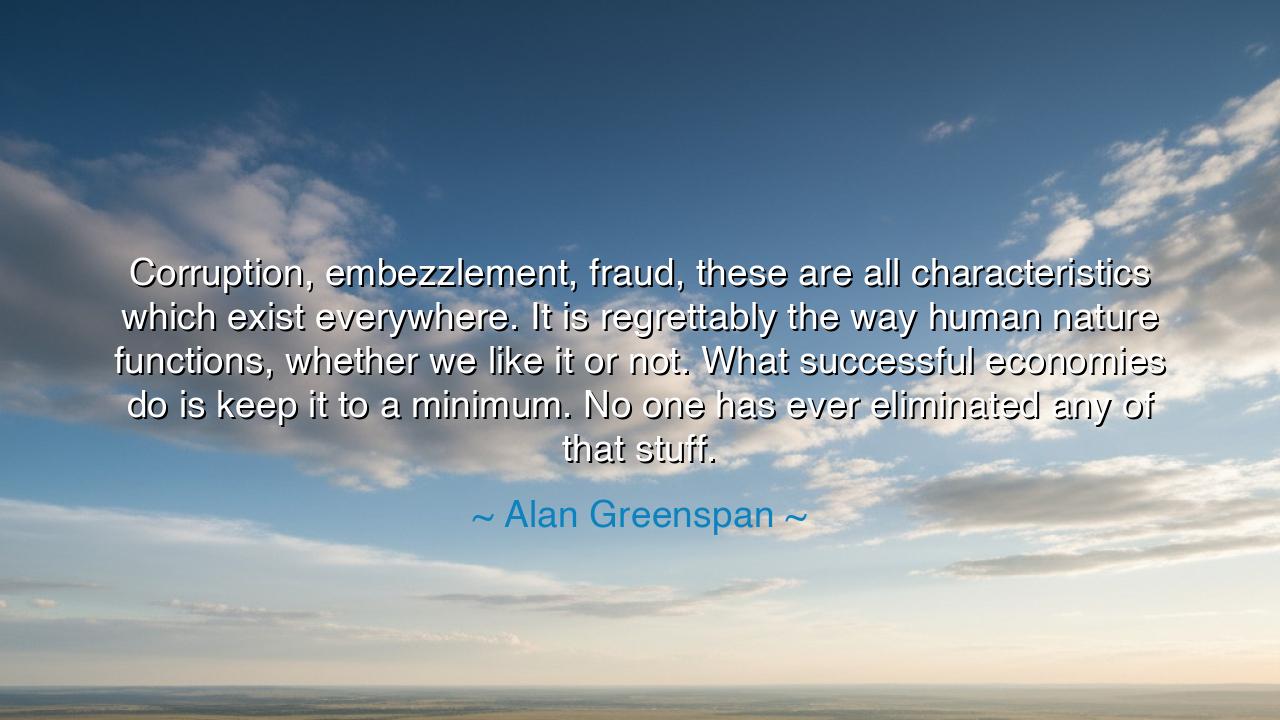
Corruption, embezzlement, fraud, these are all characteristics
Corruption, embezzlement, fraud, these are all characteristics which exist everywhere. It is regrettably the way human nature functions, whether we like it or not. What successful economies do is keep it to a minimum. No one has ever eliminated any of that stuff.






Attend, O seekers of wisdom, to the words of Alan Greenspan, who observed: “Corruption, embezzlement, fraud, these are all characteristics which exist everywhere. It is regrettably the way human nature functions, whether we like it or not. What successful economies do is keep it to a minimum. No one has ever eliminated any of that stuff.” Here lies a solemn reflection on the fallen tendencies of mankind, a recognition of the dark impulses woven into the fabric of society, and a call for prudent vigilance. The ancients, who watched kingdoms rise and fall, would nod in solemn agreement: imperfection is inherent, and the measure of governance lies not in utopian fantasies, but in the tempered management of vice.
Greenspan, a steward of modern finance, speaks not from abstraction but from the realms of commerce and policy, where the currents of human desire collide with the structures of law and order. His words illuminate a truth as old as civilization itself: that while justice and honesty may be ideals, corruption, embezzlement, and fraud are perennial shadows, appearing in every city, every marketplace, every court. From the agora of ancient Athens to the trading floors of New York, mankind’s temptations and flaws persist, a constant companion to wealth and power.
Consider the nature of these tendencies. Corruption is not merely a crime of the few, but a reflection of human susceptibility to greed, vanity, and ambition. Embezzlement and fraud follow where trust is given without oversight, where the soul is tempted by self-interest over duty. Yet Greenspan’s insight is tempered by realism: successful economies do not chase the impossible dream of perfect morality; rather, they construct systems, laws, and incentives to limit harm and encourage ethical conduct. This is the art of governance: the mastery of boundaries, the shaping of consequence, the cultivation of restraint.
History offers enduring examples. Recall the Roman Republic, a state of brilliance yet plagued by patrician greed and political corruption. Laws were enacted, magistrates were watched, and penalties enforced, yet no citizen could ever wholly escape ambition’s shadow. The Republic’s endurance lay not in eradicating vice, which proved impossible, but in minimizing its effects, channeling power through institutions that preserved stability amidst imperfection. Greenspan’s modern reflection echoes this ancient wisdom: systems matter more than dreams of perfect human nature.
O listener, heed the quiet lesson here: human nature cannot be perfected, but it can be managed. Societies rise when they recognize the inherent flaws of their members and build frameworks that reduce the harm done by greed and deceit. Acknowledging the persistence of fraud and embezzlement is not cynicism; it is prudence, a shield against idealism untempered by reality. The wisdom lies in vigilance, in monitoring, in oversight, in the subtle art of limiting opportunity for vice while rewarding virtue.
Practical guidance emerges naturally. In your own affairs, recognize that temptation is universal. Establish personal boundaries, transparent systems, and accountability to prevent the small seeds of dishonesty from growing into ruin. In organizations, advocate for structures that check and balance power, that reward integrity, and that curtail excesses. Like the governors of prosperous states, understand that while evil cannot be eliminated, its damage can be contained.
Reflect also upon the moral courage required to face human imperfection without despair. To acknowledge that fraud, corruption, and embezzlement exist in every age is to embrace a sober realism, yet it does not preclude action. On the contrary, it inspires diligence, foresight, and measured intervention, qualities that sustain trust, commerce, and communal life across generations. Greenspan’s counsel is timeless: prepare for the shadows, but cultivate light where you can.
Thus, O seeker, carry this truth within your heart: the world is a stage where human flaws play alongside virtue, where no society can ever purge corruption entirely, yet through wisdom, structure, and restraint, the impact of vice can be minimized. Let your life, your governance, and your enterprises reflect this balance: acknowledge imperfection, constrain harm, and elevate honesty and integrity, for it is in the careful management of human nature’s shadows that civilizations endure and flourish.






AAdministratorAdministrator
Welcome, honored guests. Please leave a comment, we will respond soon